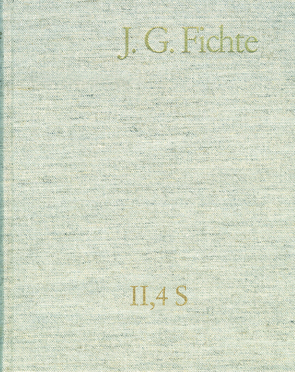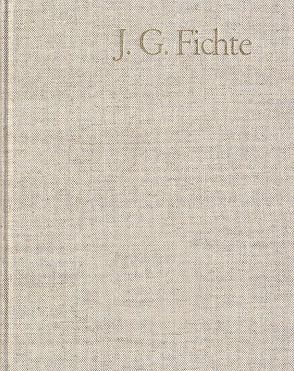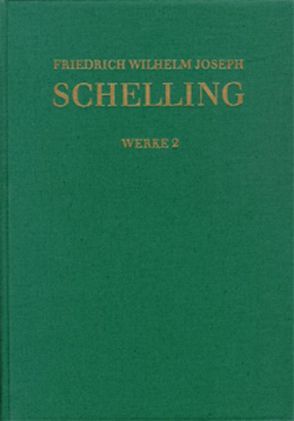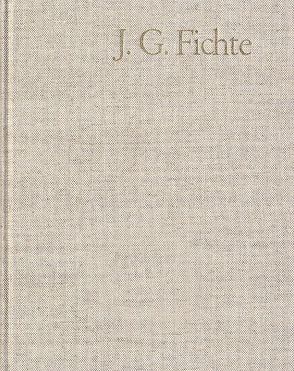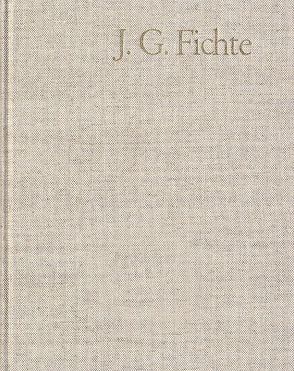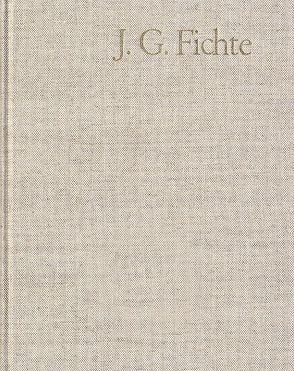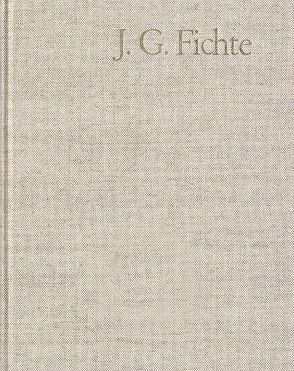Dieses Werk des bekannten Leipziger Medizin- und Philosophieprofessors erschien seit 1776 und wurde zu einem Standardwerk zur Philosophie und ihrer Geschichte. An der Universität Jena diente seine dritte Auflage schon vor Fichte auch K. C. E. Schmid und Karl Leonhard Reinhold als Vorlage für die im Lehrplan vorgeschriebenen Vorlesungen über Logik und Metaphysik. Dieser Supplementband bringt den vollständigen Text, auf den sich Fichte in seinen Jenenser Vorlesungen über Logik und Metaphysik bezieht, erstmals in Antiqua-Schrift, ergänzt um Personen- und Sachverzeichnisse.
This volume contains the text to which Fichte refers in his lectures on »Logic and Metaphysic,« supplemented by an index.
Aktualisiert: 2020-11-20
> findR *

Einige Vorlesungen Fichtes sind uns nur durch die Nachschriften seiner Hörer zugänglich, so auch die beiden Nachschriften dieses Bandes, des ›Collegiums über die Moral‹ von 1796 und der ›Vorlesungen über Logik und Metaphysik‹ von 1797/98. Sie bieten, wenn sie mit Fichtes Aufzeichnungen aus der Zeit von 1795 bis 1802 (vgl. Bd. II,4) verglichen werden, wertvollen Aufschluss über die schrittweise Entwicklung der Fichte'schen Transzendentalphilosophie zu der Form, die sie mit der ›Darstellung der Wissenschaftslehre‹ aus dem Jahre 1801 gewann. Sie enthalten aber auch Darlegungen Fichtes zur formalen Logik, zur Psychologie und zur Naturphilosophie.
Some of Fichte's lectures are available to us only in the form of transcripts made by those who attended these lectures. This includes the two transcripts contained in this volume: the ›Collegium über die Moral‹ of 1796 and ›Vorlesungen über Logik und Metaphysik‹ of 1797/98. When read in conjunction with Fichte's writings of the period 1792–1802 (see Vol. II/4), these transcripts provide valuable information concerning the gradual development of Fichte's transcendental philosophy up to the point reached in the ›Darstellung der Wissenschaftslehre‹ of 1801. They also reveal Fichte's views concerning formal logic, psychology, and philosophy of nature.
Aktualisiert: 2020-09-03
> findR *
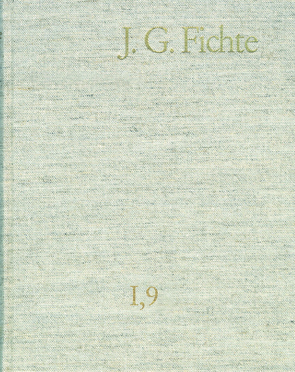
Im Hauptwerk dieses vorletzten Bandes der Werke-Reihe, der ›Anweisung zum seeligen Leben‹, geht Fichte in einem mutigen Schritt als erster bedeutender Philosoph seit Hermann Samuel Reimarus daran, die Religion und den Gedanken der Inkarnation des Absoluten vom prinzipiellen Standpunkt aus zu untersuchen. Dabei kommt er zu einem ganz anderen Resultat als z.B. Franz Volkmar Reinhard oder nachher Hegel. Polemisch wendet sich Fichte gegen die Jesus-Auffassungen Schleiermachers, Jacobis und Schellings. Diese zeitgenössischen Beziehungen wie auch deren Reflexion in der unmittelbaren Rezeption werden im ausführlichen Vorwort und in den sachlichen Nachweisen dargestellt. Der Band enthält ferner den Machiavelli-Aufsatz von 1807 sowie eine Dante-Übersetzung Fichtes.
The principle work contained in this, the penultimate volume of Part One, is the ›Anweisung zum seelingen Leben‹, a work in which Fichte takes a daring step and becomes the first important philosopher since Hermann Samuel Reimarus to investigate religion and the thought of the incarnation of the absolute from the standpoint of philosophical principles. In doing this, he arrives at a very different conclusion from that arrived at by, e.g., Franz Volkmar Reinhard or, subsequently, Hegel. He here stakes out a polemical position in opposition to the conceptions of Jesus presented by Schleiermacher, Jacobi, and Schelling. These contemporary references, as well as the manner in which they were reflected in the contemporary reception of Fichte's work, are explicated in detail in the forward to this volume. This volume also includes Fichte's treatise on Machiavelli (1807), as well as a translation of his from Dante.
Aktualisiert: 2020-09-03
> findR *
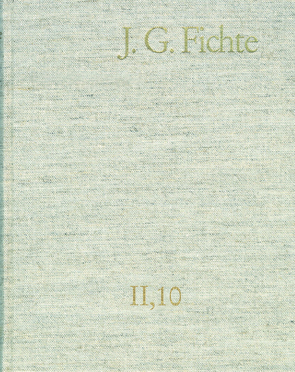
Die Niederlagen Österreichs 1805 und Preußens 1806 gegen Napoleon veranlassten Fichte, sich den politischen Problemen zuzuwenden. Er bot sich als Redner für die preußische Armee an und konzipierte Grundgedanken für eine dem Erkenntnisfortschritt entsprechende ›Republik der Deutschen‹. Seine Tagebuchaufzeichnungen halten wichtige Ereignisse seiner Flucht von Berlin nach Königsberg fest. Für seine Professur an der Königsberger Universität, die er Anfang 1807 erhielt, schrieb Fichte eine neuerliche Fassung der ›Wissenschaftslehre‹. In Kopenhagen redigierte er für eine geplante Zeitschrift seinen ›Bericht über die bisherigen Schicksale der Wissenschaftslehre‹.
The end of the Austro-Hungarian Empire, the defeat of Austria in 1805 and of Prussia in 1806, tore Fichte from his scientific studies and led him to apply himself to political problems. He opposed jingoistic Prussian patriotism, offered to serve as orator for the Prussian army, and, in the wake of the debacles of Jena and Auerstedt, drafted plans for a »Republik der Deutschen«, which would be in harmony with the advance of knowledge. His diary entries record important events during his flight from Berlin to Königsberg. At the beginning of 1807 he obtained a professorship at the University of Königsberg, which gave him the occasion to produce a new version of the ›Wissenschaftslehre‹. In Copenhagen he revised, among other works, his ›Bericht über die bisherige Schicksale der Wissenschaftslehre, darin die Abfertigung Schellings.‹
Aktualisiert: 2020-09-03
> findR *
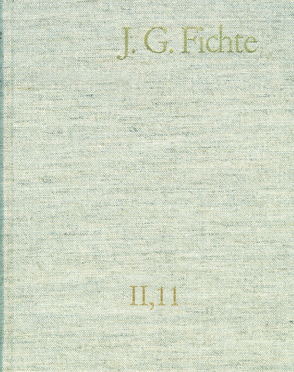
Auf der Rückreise nach Berlin fixiert Fichte im Sommer 1807 in der ›Spekulation zu Kopenhagen‹ als 'Aufgabe' die Punkte, in denen er seine ›Wissenschaftslehre‹ noch weiter klären und vertiefen will, und verfasst Entwürfe zur ›Beantwortung des Jacobischen Schreibens von 99‹. In Berlin schreibt Fichte im Regierungsauftrag den ›Plan einer zu Berlin zu errichtenden höhern Lehranstalt‹, in dem der preußischen Universität eine Art von College-System zugedacht ist. Nach den im Nachlass nicht erhaltenen ›Reden an die deutsche Nation‹ macht er sich in den Aufzeichnungen ›Seit d. 1. April 1808‹ an eine Art Generalrevision der Wissenschaftslehre. Die Vorlesungen an der Berliner Universität beginnt Fichte mit einer ›Anleitung zur Kunst des Philosophierens‹. Ihr folgt der Vortrag der ›Wissenschaftslehre‹ (1810).
His departure from East Prussia signaled a new era in Fichte's scientific life. In his ›Spekulation zu Kopenhagen‹ he located as a »task« those points on which he wished to clarify and deepen his ›Wissenschaftslehre‹ even further. The draft of a ›Beantwortung des Jacobischen Schreibens von 99‹ served as the prospectus for »establishing a philosophical journal«, a project that soon had to be abandoned because of difficulties arranging for a publisher. Upon his return to Berlin, Fichte was commissioned by Minister Beyme to prepare for the Prussian government a ›Plan einer zu Berlin zu errichtenden höhern Lehranstalt‹. In this plan Fichte proposed that the Prussian University be modeled upon a college system. But Fichte's plan was rejected in favor of Wilhelm von Humboldt's ideas. Fichte's unpublished papers contain scarcely any references to his ›Reden an die Deutsche Nation‹ (December 1807 – March 1809). Following these lectures, Fichte was engaged in a general revision of his ›Wissenschaftslehre‹. These drafts show which problems Fichte thought still needed to be addressed, and they also demonstrate that his reflections on the philosophy of history during the years from 1806 to 1809 were also highly relevant to his conception of the Wissenschaftslehre. Fichte began his lectures at the then still unofficial University of Berlin with an ›Anleitung zur Kunst des Philosophierens‹, followed, in February and March of 1810, with lectures on the ›Wissenschaftslehre‹.
Aktualisiert: 2023-03-14
> findR *
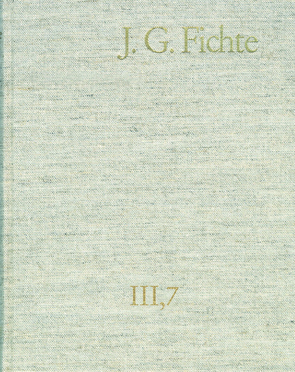
Neben den bisher aus der Briefeausgabe von W. Schulz bekannten Briefen (Korrespondenz mit den Dichtern Ernst Wagner und Fouqué, mit früheren Schülern und Verwandten) bilden die Briefe, die Fichte als Dekan und als Rektor der Berliner Universität mit den Behörden wechselte, den Schwerpunkt dieses Bandes. Unter diesen sind die Auseinandersetzungen innerhalb der Professorenschaft über die studentische Disziplin von besonderem Interesse. Fichte setzte sich mit dem Gewicht seines Amtes und seiner Persönlichkeit für einen unfair behandelten jüdischen Studenten ein und trat von seinem Amt zurück, als die überwiegende Mehrzahl seiner Kollegen auf ihrem Standpunkt beharrte.
In addition to the letters hitherto known from W. Schulz’s edition of Fichte’s Correspondence (letters to the writer Ernst Wagner, to Fichte’s father and other relatives after the death of the latter, to Fouqué, and to earlier students), the principal focus of this volume are the letters exchanged with the authorities while Fichte was the dean and rector of the University of Berlin. Especially interesting are the discussions among the professors concerning student discipline. Bringing the gravity of his office and personality to bear in his intervention on behalf of a Jewish student that had been unfairly treated, Fichte was forced to resign after the vast majority of his colleagues refused to budge from their position.
Aktualisiert: 2023-03-14
> findR *
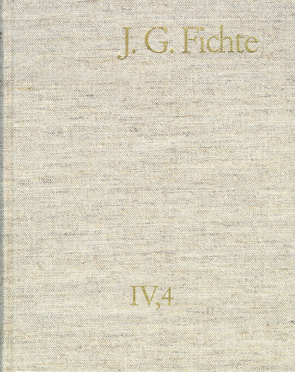
Fichtes allgemeine Einleitungsvorlesung ›Vom Studium der Philosophie‹, 1810 – nur in der Nachschrift von August Twesten erhalten – widmet sich der Frage: Wie ist die Mitteilung von Wissen möglich? Das gleiche Thema hat die Einleitungsvorlesung von 1811, deren drei Fassungen (die von Cauer, von Schopenhauer und einem Anonymus) abgedruckt werden, ebenso die Nachschriften (Cauer, Schopenhauer und »Hallesche«) der Vorlesung der ›Thatsachen des Bewußtseyns‹ aus demselben Jahr. Diese Nachschriften ergänzen einander und bieten eine objektive Darstellung der Gesamtheit des Wissens; zugleich führen sie ein in die ›Wissenschaftslehre 1812‹, die den Haupttext dieses Bandes bildet.
Fichte’s general introductory lecture of October 1810, “On the Study of Philosophy,” has been preserved only in a transcription by August Twesten (discovered in 1999). It addresses the question, How is the communication of knowledge (including empirical, historical, and a priori knowledge) possible? This is also the concern of Fichte’s introductory lecture from the winter semester of 1811/12. The latter thematizes even more clearly the difference between the methods of the sciences. Three versions of this lecture are available (by Cauer, Schopenhauer, and an anonymous auditor), and all of three of these are included in this volume. Three different transcripts of the lectures on “The Facts of Consciousness” from the same semester (1811/12) are also available (by Cauer, Schopenhauer, and an anonymous auditor, the “Halle transcript”). Fichte’s own manuscript of these lectures has not survived. This circumstance, combined with the fact that each of these three transcripts has its own distinctive advantages and supplements the other two, justifies the publication of all three. They provide an objective presentation of the totality of knowledge and serve as the didactic presupposition for understanding the complex argumentation of the 1812 Wissenschaftslehre (see Volume II,13). The primary text contained in this volume is the transcript of the 1812 Wissenschaftslehre. Of the seven surviving transcripts of this lecture series, manuscript Yg 21 (from the library of Halle University) is here published in full as the “guiding text,” though it is supplemented by significant variations, as contained in the qualitatively next-best versions (Cauer, Itzig).
Aktualisiert: 2020-09-03
> findR *
The principle work contained in this, the penultimate volume of Part One, is the ›Anweisung zum seelingen Leben‹, a work in which Fichte takes a daring step and becomes the first important philosopher since Hermann Samuel Reimarus to investigate religion and the thought of the incarnation of the absolute from the standpoint of philosophical principles. In doing this, he arrives at a very different conclusion from that arrived at by, e.g., Franz Volkmar Reinhard or, subsequently, Hegel. He here stakes out a polemical position in opposition to the conceptions of Jesus presented by Schleiermacher, Jacobi, and Schelling. These contemporary references, as well as the manner in which they were reflected in the contemporary reception of Fichte's work, are explicated in detail in the forward to this volume. This volume also includes Fichte's treatise on Machiavelli (1807), as well as a translation of his from Dante.
Aktualisiert: 2020-04-21
> findR *
Six different editions of ›Vom Ich als Princip der Philosophie‹ (On Self as a Principle of Philosophy) were incorporated in this edition. The editorial report makes it clear that in addition to the influence of Fichtes the influence of Spinozas was also very strong. The concept of the absolute takes an independent approach as opposed to Fichte’s concept of the transcendental ego. This is the first page-related edition of Schellings synopsis of ›On Self‹. The dissertation ›De Marcione‹ on the Paulinist heretic of the 2nd century concludes the theological works of his youth (see Series II). The editorial report provides insight into the history of its origins, and the annotations provide information on the theological literature which Schelling used. The translation into German makes the text more easily accessible.
Aktualisiert: 2021-11-11
> findR *
Some of Fichte's lectures are available to us only in the form of transcripts made by those who attended these lectures. This includes the two transcripts contained in this volume: the ›Collegium über die Moral‹ of 1796 and ›Vorlesungen über Logik und Metaphysik‹ of 1797/98. When read in conjunction with Fichte's writings of the period 1792–1802 (see Vol. II/4), these transcripts provide valuable information concerning the gradual development of Fichte's transcendental philosophy up to the point reached in the ›Darstellung der Wissenschaftslehre‹ of 1801. They also reveal Fichte's views concerning formal logic, psychology, and philosophy of nature.
Aktualisiert: 2019-08-19
> findR *
The end of the Austro-Hungarian Empire, the defeat of Austria in 1805 and of Prussia in 1806, tore Fichte from his scientific studies and led him to apply himself to political problems. He opposed jingoistic Prussian patriotism, offered to serve as orator for the Prussian army, and, in the wake of the debacles of Jena and Auerstedt, drafted plans for a »Republik der Deutschen«, which would be in harmony with the advance of knowledge. His diary entries record important events during his flight from Berlin to Königsberg. At the beginning of 1807 he obtained a professorship at the University of Königsberg, which gave him the occasion to produce a new version of the ›Wissenschaftslehre‹. In Copenhagen he revised, among other works, his ›Bericht über die bisherige Schicksale der Wissenschaftslehre, darin die Abfertigung Schellings.‹
Aktualisiert: 2020-04-22
> findR *
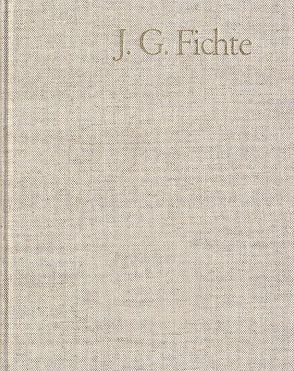
Fichte’s general introductory lecture of October 1810, “On the Study of Philosophy,” has been preserved only in a transcription by August Twesten (discovered in 1999). It addresses the question, How is the communication of knowledge (including empirical, historical, and a priori knowledge) possible? This is also the concern of Fichte’s introductory lecture from the winter semester of 1811/12. The latter thematizes even more clearly the difference between the methods of the sciences. Three versions of this lecture are available (by Cauer, Schopenhauer, and an anonymous auditor), and all of three of these are included in this volume. Three different transcripts of the lectures on “The Facts of Consciousness” from the same semester (1811/12) are also available (by Cauer, Schopenhauer, and an anonymous auditor, the “Halle transcript”). Fichte’s own manuscript of these lectures has not survived. This circumstance, combined with the fact that each of these three transcripts has its own distinctive advantages and supplements the other two, justifies the publication of all three. They provide an objective presentation of the totality of knowledge and serve as the didactic presupposition for understanding the complex argumentation of the 1812 Wissenschaftslehre (see Volume II,13). The primary text contained in this volume is the transcript of the 1812 Wissenschaftslehre. Of the seven surviving transcripts of this lecture series, manuscript Yg 21 (from the library of Halle University) is here published in full as the “guiding text,” though it is supplemented by significant variations, as contained in the qualitatively next-best versions (Cauer, Itzig).
Aktualisiert: 2020-04-22
> findR *
This volume contains the text to which Fichte refers in his lectures on Logic and Metaphysic, supplemented by an index.
Aktualisiert: 2019-08-19
> findR *
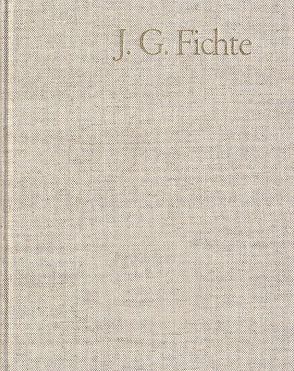
His departure from East Prussia signaled a new era in Fichte's scientific life. In his ›Spekulation zu Kopenhagen‹ he located as a »task« those points on which he wished to clarify and deepen his ›Wissenschaftslehre‹ even further. The draft of a ›Beantwortung des Jacobischen Schreibens von 99‹ served as the prospectus for »establishing a philosophical journal«, a project that soon had to be abandoned because of difficulties arranging for a publisher. Upon his return to Berlin, Fichte was commissioned by Minister Beyme to prepare for the Prussian government a ›Plan einer zu Berlin zu errichtenden höhern Lehranstalt‹. In this plan Fichte proposed that the Prussian University be modeled upon a college system. But Fichte's plan was rejected in favor of Wilhelm von Humboldt's ideas. Fichte's unpublished papers contain scarcely any references to his ›Reden an die Deutsche Nation‹ (December 1807 – March 1809). Following these lectures, Fichte was engaged in a general revision of his ›Wissenschaftslehre‹. These drafts show which problems Fichte thought still needed to be addressed, and they also demonstrate that his reflections on the philosophy of history during the years from 1806 to 1809 were also highly relevant to his conception of the Wissenschaftslehre. Fichte began his lectures at the then still unofficial University of Berlin with an ›Anleitung zur Kunst des Philosophierens‹, followed, in February and March of 1810, with lectures on the ›Wissenschaftslehre‹.
Aktualisiert: 2023-03-14
> findR *
In addition to the letters hitherto known from W. Schulz’s edition of Fichte’s Correspondence (letters to the writer Ernst Wagner, to Fichte’s father and other relatives after the death of the latter, to Fouqué, and to earlier students), the principal focus of this volume are the letters exchanged with the authorities while Fichte was the dean and rector of the University of Berlin. Especially interesting are the discussions among the professors concerning student discipline. Bringing the gravity of his office and personality to bear in his intervention on behalf of a Jewish student that had been unfairly treated, Fichte was forced to resign after the vast majority of his colleagues refused to budge from their position.
Aktualisiert: 2023-03-14
> findR *
MEHR ANZEIGEN
Bücher von Schurr-Lorusso, Anna Maria
Sie suchen ein Buch oder Publikation vonSchurr-Lorusso, Anna Maria ? Bei Buch findr finden Sie alle Bücher Schurr-Lorusso, Anna Maria.
Entdecken Sie neue Bücher oder Klassiker für Sie selbst oder zum Verschenken. Buch findr hat zahlreiche Bücher
von Schurr-Lorusso, Anna Maria im Sortiment. Nehmen Sie sich Zeit zum Stöbern und finden Sie das passende Buch oder die
Publiketion für Ihr Lesevergnügen oder Ihr Interessensgebiet. Stöbern Sie durch unser Angebot und finden Sie aus
unserer großen Auswahl das Buch, das Ihnen zusagt. Bei Buch findr finden Sie Romane, Ratgeber, wissenschaftliche und
populärwissenschaftliche Bücher uvm. Bestellen Sie Ihr Buch zu Ihrem Thema einfach online und lassen Sie es sich
bequem nach Hause schicken. Wir wünschen Ihnen schöne und entspannte Lesemomente mit Ihrem Buch
von Schurr-Lorusso, Anna Maria .
Schurr-Lorusso, Anna Maria - Große Auswahl an Publikationen bei Buch findr
Bei uns finden Sie Bücher aller beliebter Autoren, Neuerscheinungen, Bestseller genauso wie alte Schätze. Bücher
von Schurr-Lorusso, Anna Maria die Ihre Fantasie anregen und Bücher, die Sie weiterbilden und Ihnen wissenschaftliche Fakten
vermitteln. Ganz nach Ihrem Geschmack ist das passende Buch für Sie dabei. Finden Sie eine große Auswahl Bücher
verschiedenster Genres, Verlage, Schlagworte Genre bei Buchfindr:
Unser Repertoire umfasst Bücher von
- Schürrer, Hermann
- Schürrer, Martin
- Schürrer, Stefan
- Schürrer, Stefan
- Schürrle, Anna
- Schürrle, Thomas
- Schürrle, Thomas
- Schurse, Lars
- Schürstedt, Marcus A.
- Schurt, Verena
Sie haben viele Möglichkeiten bei Buch findr die passenden Bücher für Ihr Lesevergnügen zu entdecken. Nutzen Sie
unsere Suchfunktionen, um zu stöbern und für Sie interessante Bücher in den unterschiedlichen Genres und Kategorien
zu finden. Neben Büchern von Schurr-Lorusso, Anna Maria und Büchern aus verschiedenen Kategorien finden Sie schnell und
einfach auch eine Auflistung thematisch passender Publikationen. Probieren Sie es aus, legen Sie jetzt los! Ihrem
Lesevergnügen steht nichts im Wege. Nutzen Sie die Vorteile Ihre Bücher online zu kaufen und bekommen Sie die
bestellten Bücher schnell und bequem zugestellt. Nehmen Sie sich die Zeit, online die Bücher Ihrer Wahl anzulesen,
Buchempfehlungen und Rezensionen zu studieren, Informationen zu Autoren zu lesen. Viel Spaß beim Lesen wünscht Ihnen
das Team von Buchfindr.
